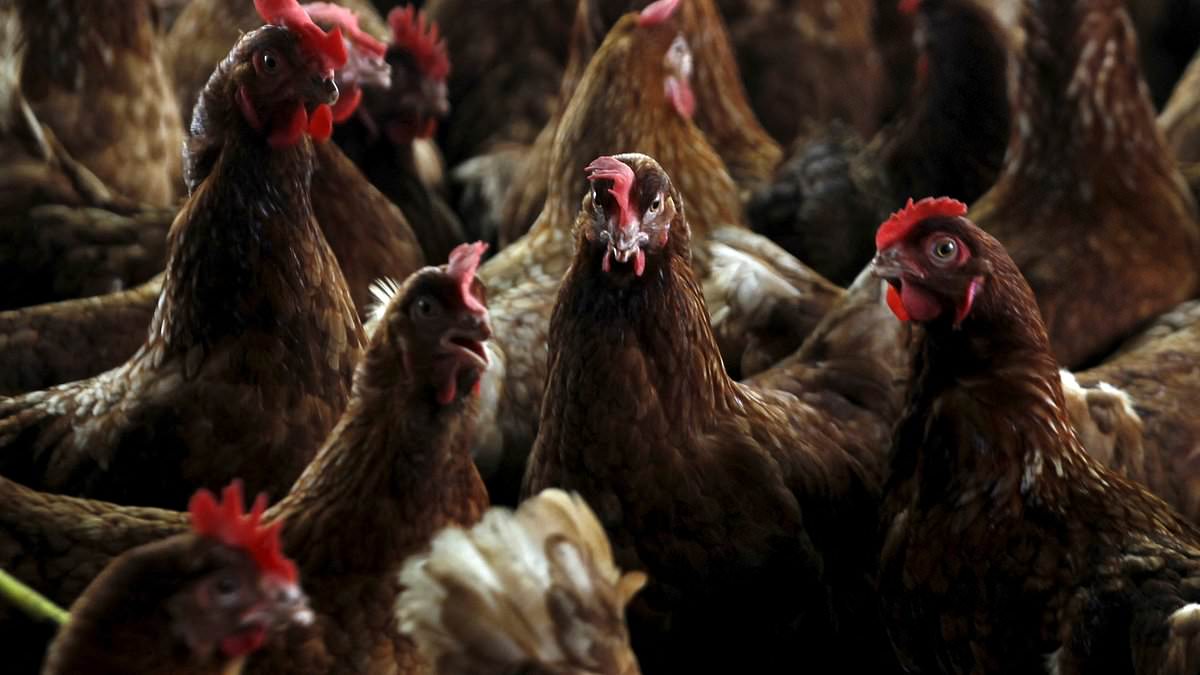Bird flu has been detected at a fourth poultry farm in Victoria in bad news for supermarkets struggling to meet demand for eggs.
The cases of H7N8 bird flu can be linked back to an ongoing outbreak at Kinross Farms in Euroa, regional Victoria.
The new detection has triggered further concerns for ‘s egg supply following the country’s largest-ever avian influenza outbreak last year.
Kinross Farms managing director Philip Szepe said 90,000 birds will need to be killed to control the spread of the disease.
‘As we have seen, it is not unusual for an avian influenza outbreak to spread to neighbouring properties within the restricted zone,’ he told the ABC.
‘Now that all our laying farms in the Euroa area have been or are being depopulated, we have a clear path forward for recovery, and a plan for the process required to return our farms to productivity.
‘We have seen, from last year’s response to an avian influenza outbreak, that farms can manage the decontamination and sanitation process successfully and bring hens back to their farms safely following strict recovery guidelines.’
The federally agreed biosecurity plan states all birds with high pathogenic bird flu must be killed.
About 600,000 birds have been culled due to the current outbreak.
Victoria’s acting chief veterinary officer Cameron Bell said more than 100 people were assisting in containing and eradicating the virus.
‘If you are in the control or restricted areas, you cannot move birds, products or equipment into, out of, or within the area without permit,’ he said.
‘This includes selling or giving away eggs from your poultry. These must not leave your property.’
The restricted zones span a 5km radius around any infected farms.
A broader control area has been established around Strathbogie Shire east of the Goulburn Valley Freeway, which includes the townships of Euroa, Violet Town, Longwood, Ruffy, Avenel and Strathbogie.
Birds on properties in restricted areas are required to be kept in cages or sheds to avoid cross contamination with affected birds.
Community members must report any suspected disease and sudden poultry death through the VicEmergency Hotline on 1800 226 226.
Last year, Victoria experienced ‘s largest avian influenza outbreak on record.
Between late May and late June, eight properties tested positive for H7N3 and H7N9 avian influenza in south-west Victoria.
There was cautious relief last week from egg farmers nationally that they can start to rebuild a devastated industry.
Production was expected to return to normal levels in spring, depending on further outbreaks.
Egg prices aren’t expected to drop, with the industry expected to pay 20 per cent of the clean-up, forcing farmers to pass on costs to consumers.
Over the past five decades, has successfully contained and eradicated H7 bird flu multiple times,
But there are fears the H5N1 strain, which has devastated animal populations overseas, could find its way to n shores via the migration patterns of wild birds.
The federal government is investing more than $100 million to bolster national preparedness.
Avian influenza, commonly known as ‘bird flu’, is a highly contagious virus that can cause sudden death in poultry.
The World Health Organisation says the deadly H5N1 strain rarely affects humans and is not easily transferred between people.
